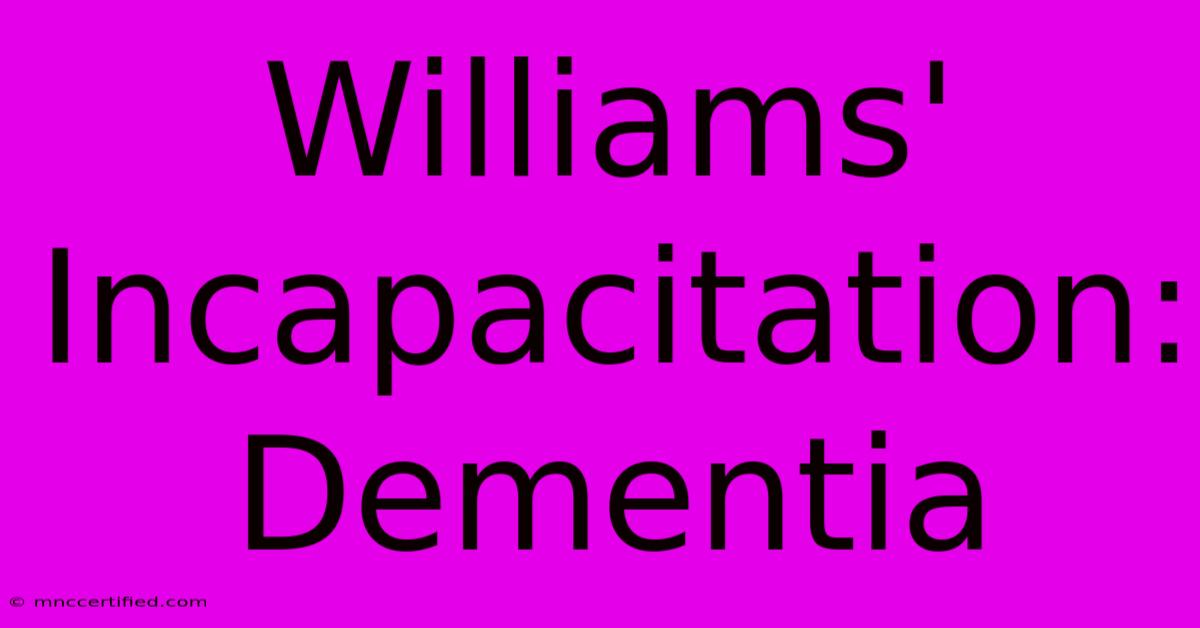Williams' Incapacitation: Dementia

Table of Contents
Williams' Incapacitation: Understanding the Impact of Dementia
Dementia, a debilitating neurological condition, significantly impacts an individual's capacity for self-care and decision-making. This article will explore the complexities of incapacitation due to dementia, focusing on the challenges faced by individuals diagnosed with the condition, their families, and caregivers. We'll delve into the legal and ethical implications of Williams' incapacitation, considering the specific circumstances and the need for appropriate interventions. We'll also address the importance of early diagnosis and proactive planning for future care.
Understanding Dementia and its Impact on Capacity
Dementia is not a single disease but rather an umbrella term encompassing various conditions affecting cognitive abilities, including memory, thinking, and judgment. Alzheimer's disease is the most common cause, but other forms, such as vascular dementia and Lewy body dementia, also contribute significantly to the global burden of this devastating illness. As dementia progresses, individuals gradually lose the ability to perform everyday tasks, manage their finances, and make informed decisions. This loss of capacity, often referred to as incapacitation, poses significant challenges across various aspects of life.
Stages of Dementia and Loss of Capacity
The progression of dementia is gradual, often divided into stages reflecting increasing levels of incapacitation:
-
Early Stage: Mild cognitive impairment may be present. Individuals might experience forgetfulness but can still generally manage daily activities independently. Capacity is usually intact, though some assistance might be required for complex tasks.
-
Middle Stage: Significant cognitive decline occurs. Daily living tasks become increasingly difficult, requiring more assistance. Capacity for complex decision-making, such as managing finances or legal matters, is typically diminished.
-
Late Stage: Severe cognitive impairment renders the individual entirely dependent on others for all aspects of care. Capacity is significantly compromised, if not completely lost.
Legal and Ethical Considerations of Williams' Incapacitation
When an individual with dementia loses capacity, important legal and ethical considerations arise. These include:
-
Advance Care Planning: Proactive planning, including the execution of advance directives (such as living wills and durable power of attorney for healthcare), is crucial. These documents outline an individual's wishes regarding medical treatment and financial affairs in the event of incapacitation.
-
Guardianship and Conservatorship: If an individual lacks capacity to make decisions, a court may appoint a guardian or conservator to manage their affairs. This legal process protects the individual's rights and well-being.
-
Ethical Dilemmas: Difficult ethical decisions may arise concerning medical treatment, particularly towards the end of life. Balancing the individual's wishes (as expressed in advance directives or inferred from their values) with the realities of their condition requires careful consideration and compassionate discussion among family, caregivers, and medical professionals.
Supporting Individuals with Dementia and their Families
Providing support for individuals with dementia and their families is crucial. This involves:
-
Early Diagnosis and Intervention: Early diagnosis allows for timely access to treatments that may slow disease progression and improve quality of life.
-
Cognitive Stimulation Therapy: Various therapies can help to maintain cognitive function and improve overall well-being.
-
Caregiver Support: Caregiving for individuals with dementia can be extremely demanding, both emotionally and physically. Support groups, respite care, and counseling services can be invaluable.
-
Access to Resources: Numerous organizations offer support and information to individuals with dementia and their families.
Conclusion: Navigating the Challenges of Williams' Incapacitation
Williams' incapacitation due to dementia underscores the profound impact of this condition on individuals, families, and society. Proactive planning, early diagnosis, and access to appropriate support are essential for navigating the complexities of dementia and ensuring a dignified quality of life. Understanding the legal and ethical considerations involved is crucial for making informed decisions that respect the individual's rights and well-being. Further research into effective treatments and support systems is crucial to alleviate the burden of this widespread and devastating condition. By fostering greater awareness and improving access to resources, we can better support individuals living with dementia and their families.

Thank you for visiting our website wich cover about Williams' Incapacitation: Dementia. We hope the information provided has been useful to you. Feel free to contact us if you have any questions or need further assistance. See you next time and dont miss to bookmark.
Featured Posts
-
Champions League Sporting Cp Vs Arsenal
Nov 27, 2024
-
Man City Vs Feyenoord Champions League Live
Nov 27, 2024
-
Car Insurance Lawrenceville Ga
Nov 27, 2024
-
Morgan Freeman 87 Recent Public Appearance
Nov 27, 2024
-
Dramatic Champions League Draw For City
Nov 27, 2024